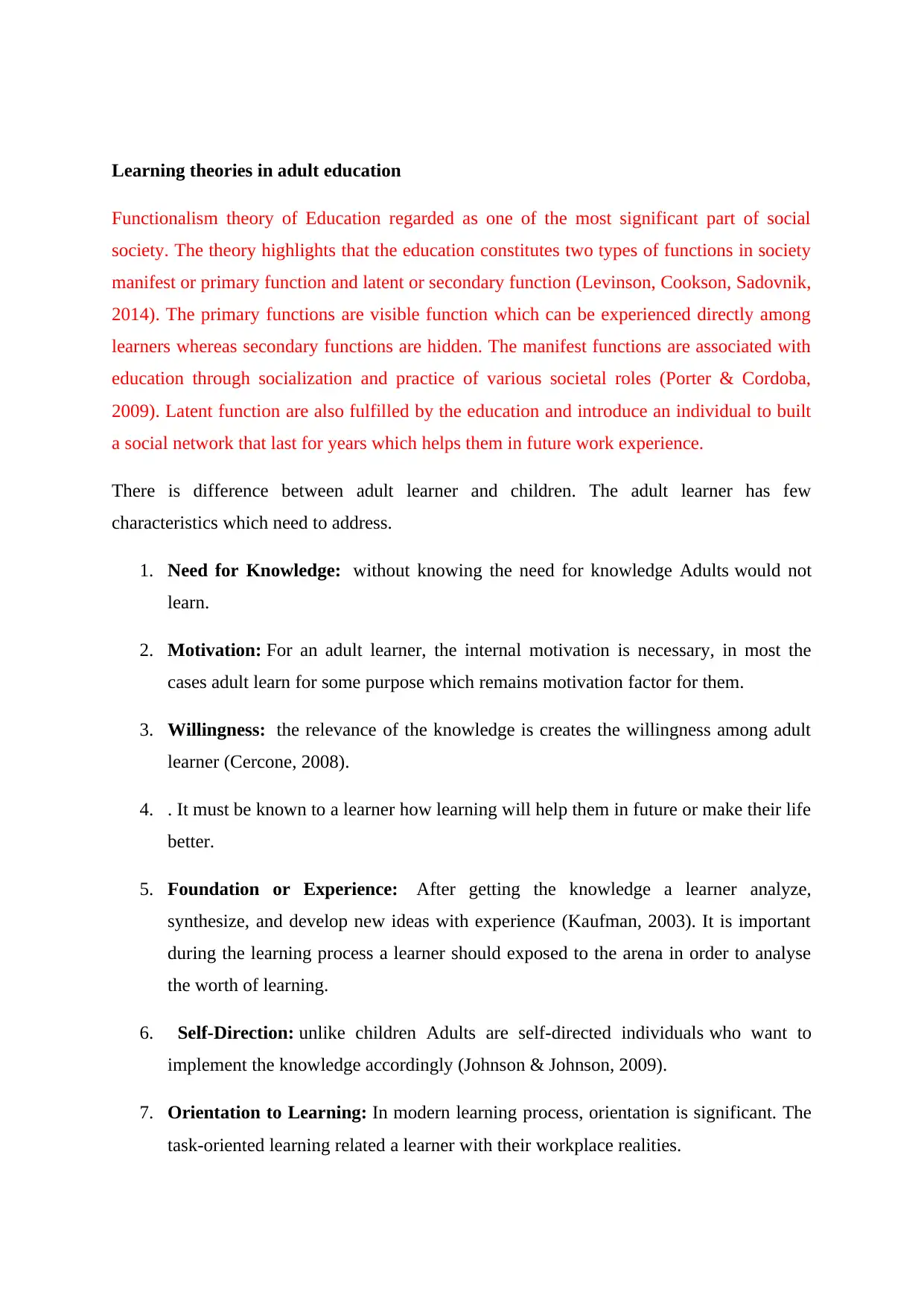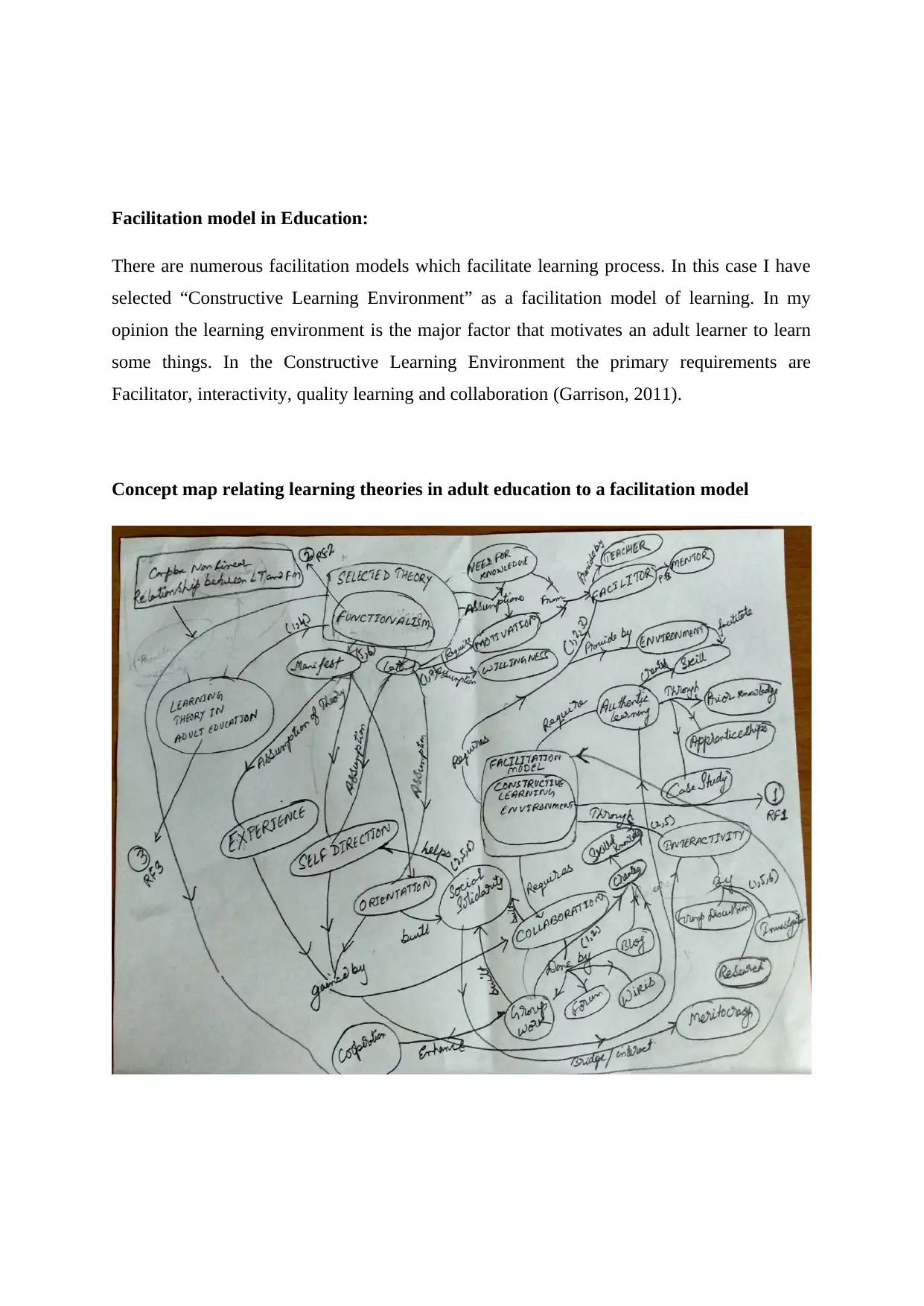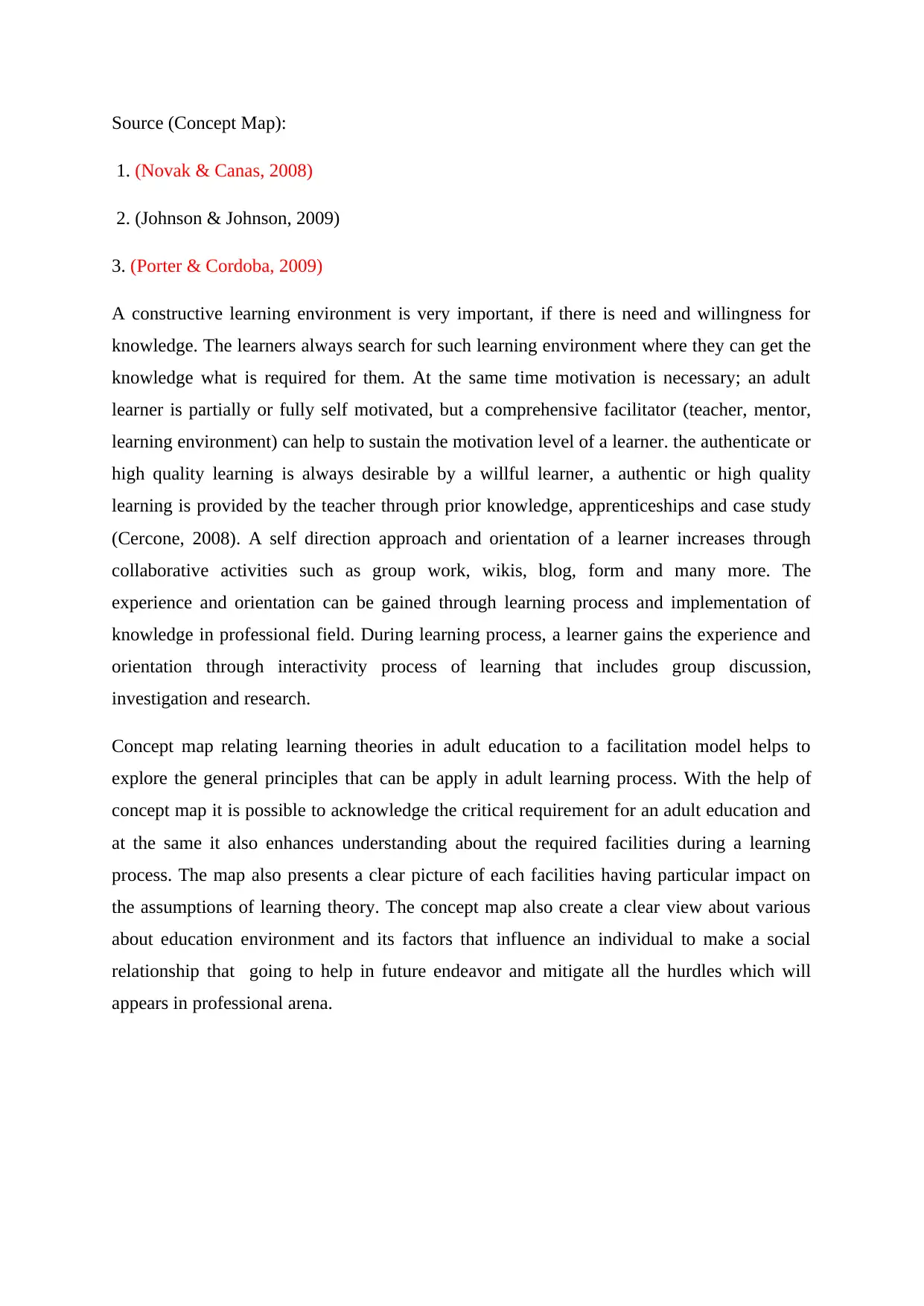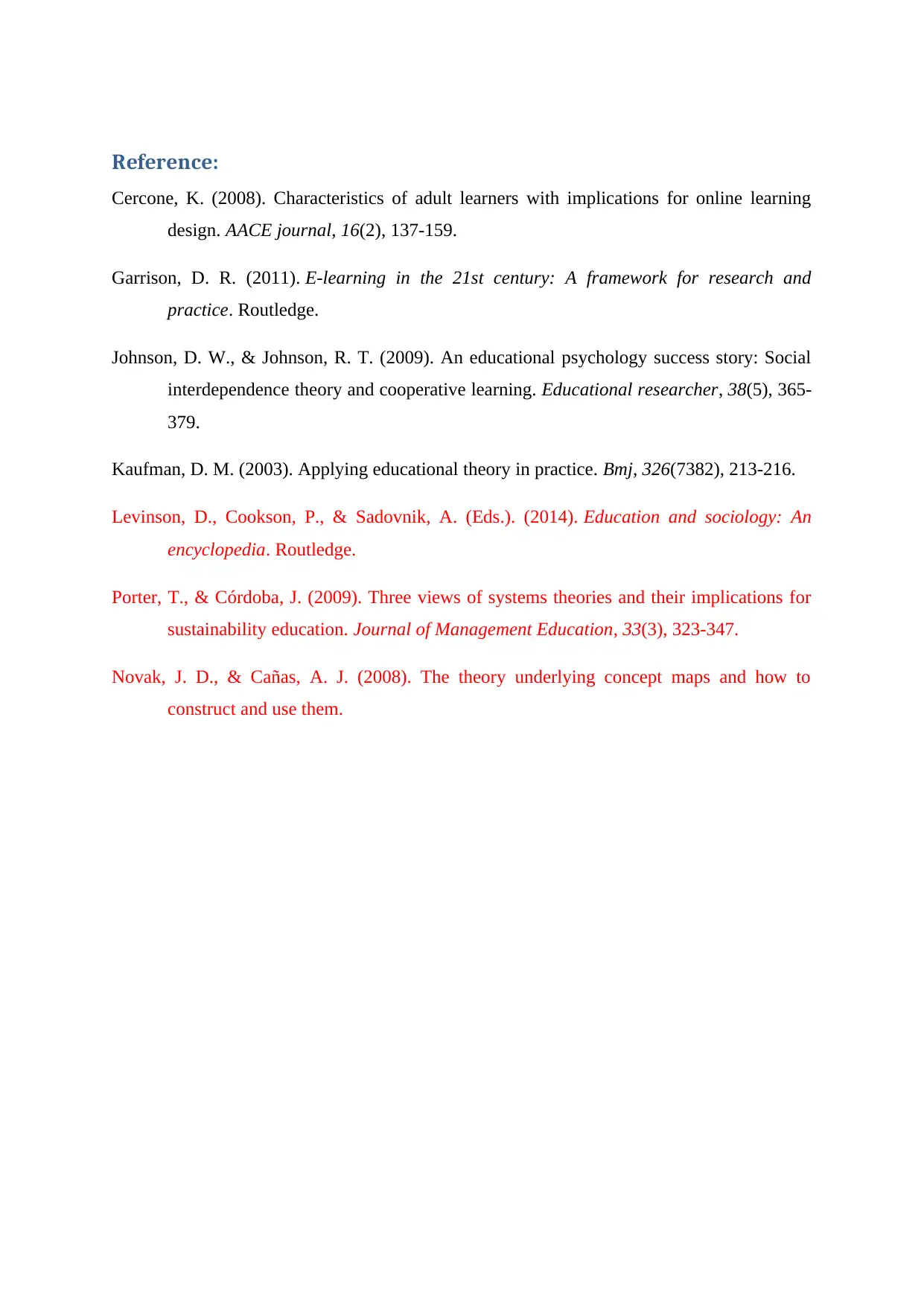Applying Learning Theories: Facilitation Models in Adult Education
VerifiedAdded on 2023/06/05
|4
|980
|182
Essay
AI Summary
This essay explores learning theories in adult education, focusing on the functionalism theory and its manifest and latent functions. It highlights the unique characteristics of adult learners, including their need for knowledge, motivation, willingness, and self-direction. The essay also discusses the importance of a constructive learning environment as a facilitation model, emphasizing the roles of the facilitator, interactivity, quality learning, and collaboration. A concept map illustrates the relationship between learning theories and the facilitation model, underscoring the critical requirements for adult education and the impact of various factors on building social relationships and mitigating professional challenges. The essay references key works in the field to support its analysis and conclusions.

Learning theories in adult education
Functionalism theory of Education regarded as one of the most significant part of social
society. The theory highlights that the education constitutes two types of functions in society
manifest or primary function and latent or secondary function (Levinson, Cookson, Sadovnik,
2014). The primary functions are visible function which can be experienced directly among
learners whereas secondary functions are hidden. The manifest functions are associated with
education through socialization and practice of various societal roles (Porter & Cordoba,
2009). Latent function are also fulfilled by the education and introduce an individual to built
a social network that last for years which helps them in future work experience.
There is difference between adult learner and children. The adult learner has few
characteristics which need to address.
1. Need for Knowledge: without knowing the need for knowledge Adults would not
learn.
2. Motivation: For an adult learner, the internal motivation is necessary, in most the
cases adult learn for some purpose which remains motivation factor for them.
3. Willingness: the relevance of the knowledge is creates the willingness among adult
learner (Cercone, 2008).
4. . It must be known to a learner how learning will help them in future or make their life
better.
5. Foundation or Experience: After getting the knowledge a learner analyze,
synthesize, and develop new ideas with experience (Kaufman, 2003). It is important
during the learning process a learner should exposed to the arena in order to analyse
the worth of learning.
6. Self-Direction: unlike children Adults are self-directed individuals who want to
implement the knowledge accordingly (Johnson & Johnson, 2009).
7. Orientation to Learning: In modern learning process, orientation is significant. The
task-oriented learning related a learner with their workplace realities.
Functionalism theory of Education regarded as one of the most significant part of social
society. The theory highlights that the education constitutes two types of functions in society
manifest or primary function and latent or secondary function (Levinson, Cookson, Sadovnik,
2014). The primary functions are visible function which can be experienced directly among
learners whereas secondary functions are hidden. The manifest functions are associated with
education through socialization and practice of various societal roles (Porter & Cordoba,
2009). Latent function are also fulfilled by the education and introduce an individual to built
a social network that last for years which helps them in future work experience.
There is difference between adult learner and children. The adult learner has few
characteristics which need to address.
1. Need for Knowledge: without knowing the need for knowledge Adults would not
learn.
2. Motivation: For an adult learner, the internal motivation is necessary, in most the
cases adult learn for some purpose which remains motivation factor for them.
3. Willingness: the relevance of the knowledge is creates the willingness among adult
learner (Cercone, 2008).
4. . It must be known to a learner how learning will help them in future or make their life
better.
5. Foundation or Experience: After getting the knowledge a learner analyze,
synthesize, and develop new ideas with experience (Kaufman, 2003). It is important
during the learning process a learner should exposed to the arena in order to analyse
the worth of learning.
6. Self-Direction: unlike children Adults are self-directed individuals who want to
implement the knowledge accordingly (Johnson & Johnson, 2009).
7. Orientation to Learning: In modern learning process, orientation is significant. The
task-oriented learning related a learner with their workplace realities.
Paraphrase This Document
Need a fresh take? Get an instant paraphrase of this document with our AI Paraphraser

Facilitation model in Education:
There are numerous facilitation models which facilitate learning process. In this case I have
selected “Constructive Learning Environment” as a facilitation model of learning. In my
opinion the learning environment is the major factor that motivates an adult learner to learn
some things. In the Constructive Learning Environment the primary requirements are
Facilitator, interactivity, quality learning and collaboration (Garrison, 2011).
Concept map relating learning theories in adult education to a facilitation model
There are numerous facilitation models which facilitate learning process. In this case I have
selected “Constructive Learning Environment” as a facilitation model of learning. In my
opinion the learning environment is the major factor that motivates an adult learner to learn
some things. In the Constructive Learning Environment the primary requirements are
Facilitator, interactivity, quality learning and collaboration (Garrison, 2011).
Concept map relating learning theories in adult education to a facilitation model

Source (Concept Map):
1. (Novak & Canas, 2008)
2. (Johnson & Johnson, 2009)
3. (Porter & Cordoba, 2009)
A constructive learning environment is very important, if there is need and willingness for
knowledge. The learners always search for such learning environment where they can get the
knowledge what is required for them. At the same time motivation is necessary; an adult
learner is partially or fully self motivated, but a comprehensive facilitator (teacher, mentor,
learning environment) can help to sustain the motivation level of a learner. the authenticate or
high quality learning is always desirable by a willful learner, a authentic or high quality
learning is provided by the teacher through prior knowledge, apprenticeships and case study
(Cercone, 2008). A self direction approach and orientation of a learner increases through
collaborative activities such as group work, wikis, blog, form and many more. The
experience and orientation can be gained through learning process and implementation of
knowledge in professional field. During learning process, a learner gains the experience and
orientation through interactivity process of learning that includes group discussion,
investigation and research.
Concept map relating learning theories in adult education to a facilitation model helps to
explore the general principles that can be apply in adult learning process. With the help of
concept map it is possible to acknowledge the critical requirement for an adult education and
at the same it also enhances understanding about the required facilities during a learning
process. The map also presents a clear picture of each facilities having particular impact on
the assumptions of learning theory. The concept map also create a clear view about various
about education environment and its factors that influence an individual to make a social
relationship that going to help in future endeavor and mitigate all the hurdles which will
appears in professional arena.
1. (Novak & Canas, 2008)
2. (Johnson & Johnson, 2009)
3. (Porter & Cordoba, 2009)
A constructive learning environment is very important, if there is need and willingness for
knowledge. The learners always search for such learning environment where they can get the
knowledge what is required for them. At the same time motivation is necessary; an adult
learner is partially or fully self motivated, but a comprehensive facilitator (teacher, mentor,
learning environment) can help to sustain the motivation level of a learner. the authenticate or
high quality learning is always desirable by a willful learner, a authentic or high quality
learning is provided by the teacher through prior knowledge, apprenticeships and case study
(Cercone, 2008). A self direction approach and orientation of a learner increases through
collaborative activities such as group work, wikis, blog, form and many more. The
experience and orientation can be gained through learning process and implementation of
knowledge in professional field. During learning process, a learner gains the experience and
orientation through interactivity process of learning that includes group discussion,
investigation and research.
Concept map relating learning theories in adult education to a facilitation model helps to
explore the general principles that can be apply in adult learning process. With the help of
concept map it is possible to acknowledge the critical requirement for an adult education and
at the same it also enhances understanding about the required facilities during a learning
process. The map also presents a clear picture of each facilities having particular impact on
the assumptions of learning theory. The concept map also create a clear view about various
about education environment and its factors that influence an individual to make a social
relationship that going to help in future endeavor and mitigate all the hurdles which will
appears in professional arena.
⊘ This is a preview!⊘
Do you want full access?
Subscribe today to unlock all pages.

Trusted by 1+ million students worldwide

Reference:
Cercone, K. (2008). Characteristics of adult learners with implications for online learning
design. AACE journal, 16(2), 137-159.
Garrison, D. R. (2011). E-learning in the 21st century: A framework for research and
practice. Routledge.
Johnson, D. W., & Johnson, R. T. (2009). An educational psychology success story: Social
interdependence theory and cooperative learning. Educational researcher, 38(5), 365-
379.
Kaufman, D. M. (2003). Applying educational theory in practice. Bmj, 326(7382), 213-216.
Levinson, D., Cookson, P., & Sadovnik, A. (Eds.). (2014). Education and sociology: An
encyclopedia. Routledge.
Porter, T., & Córdoba, J. (2009). Three views of systems theories and their implications for
sustainability education. Journal of Management Education, 33(3), 323-347.
Novak, J. D., & Cañas, A. J. (2008). The theory underlying concept maps and how to
construct and use them.
Cercone, K. (2008). Characteristics of adult learners with implications for online learning
design. AACE journal, 16(2), 137-159.
Garrison, D. R. (2011). E-learning in the 21st century: A framework for research and
practice. Routledge.
Johnson, D. W., & Johnson, R. T. (2009). An educational psychology success story: Social
interdependence theory and cooperative learning. Educational researcher, 38(5), 365-
379.
Kaufman, D. M. (2003). Applying educational theory in practice. Bmj, 326(7382), 213-216.
Levinson, D., Cookson, P., & Sadovnik, A. (Eds.). (2014). Education and sociology: An
encyclopedia. Routledge.
Porter, T., & Córdoba, J. (2009). Three views of systems theories and their implications for
sustainability education. Journal of Management Education, 33(3), 323-347.
Novak, J. D., & Cañas, A. J. (2008). The theory underlying concept maps and how to
construct and use them.
1 out of 4
Related Documents
Your All-in-One AI-Powered Toolkit for Academic Success.
+13062052269
info@desklib.com
Available 24*7 on WhatsApp / Email
![[object Object]](/_next/static/media/star-bottom.7253800d.svg)
Unlock your academic potential
Copyright © 2020–2026 A2Z Services. All Rights Reserved. Developed and managed by ZUCOL.



